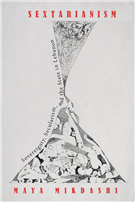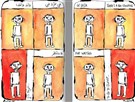Lebanon has been without a government for months. Finally, a thirty-member cabinet was formed two weeks ago. With a revolutionary uprising in Syria and the brutal response by the Syrian regime intensifying, there is now a Lebanese government whose sole function, it seems, is to weather the storm at the country`s northern border, the increasing instability of its border to the south, and the Special Tribunal for Lebanon`s indictment that approaches the country with the unstoppable velocity of a train wreck. What this constellation of forces will bring is unknown, but it is certain that when the floodgates open, we will either sink or swim in a tide of violence and further instability. Sitting at my desk in Beirut, I can confidently say to critics abroad that yes, it can get even more unstable. However, as analysts, journalists and activists question this muscular “macro-picture” we must not lose sight of all the daily struggles that form our lives as humans, citizens, refugees, migrants, and political beings. Yes, it is true that the coming months will be critical to the fate of the Arab-Israeli, and Palestinian-Israeli, struggle. It is true that in Lebanon, we must be concerned with the fate of the resistance and with it, our geopolitical placement in this new Middle East. But is this where the struggle for social justice begins and ends?
I have been reading accounts of the demise of the Lebanese left with some ambivalence. After all, has the word “left” come to only mean supporting the resistance? Is supporting Hezbollah, the group that is only the most recent incarnation of Lebanese resistance to Israel (and an incarnation with troubling economic policies, at that), all it takes to win your “leftist” credentials in Lebanon today? What about other historically progressive issues, such as questions of gender and economic equity, or political rights and the freedom of expression? Since the protests began in Syria, many Lebanese activists who consider themselves part of "the left" (you can see many of them, chain smoking their way through cups of coffee in cafes) have been wringing their hands over the fate of the Syrian regime while self-proclaimed “leftist parties” have been chest pounding their way through Ras Beirut. I recently told a friend of mine that I was working on a piece for Jadaliyya about the fatwa issued by Lebanon`s Mufti “analyzing” a proposed civil law to protect women and children (but not, it seems, men) against domestic violence. This particular "leftist" patiently explained to me that now is not the time write about these “micro” issues, not while the “greater good” is at stake. My friend was telling me that my time and intellect were better spent writing about “the big picture.” But what exactly is this bigger picture if not an intricate mosaic of interconnected inequalities, and what is the “greater good” if not a silent prayer for those people that will be sacrificed in order to achieve it?
This article is now featured in Jadaliyya`s edited volume entitled Dawn of the Arab Uprisings: End of An Old Order? (Pluto Press, 2012). The volume documents the first six months of the Arab uprisings, explaining the backgrounds and trajectories of these popular movements. It also archives the range of responses that emanated from activists, scholars, and analysts as they sought to make sense of the rapidly unfolding events. Click here to access the full article by ordering your copy of Dawn of the Arab Uprisings from Amazon, or use the link below to purchase from the publisher.

![[Anti and Pro-Bashar Protestors Separated by Lebanese Army; Image From Unknown Archive]](https://kms.jadaliyya.com/Images/357x383xo/2011-04-12-ap-syria-protestsjpg-047c9620ca4c3183.jpg)





